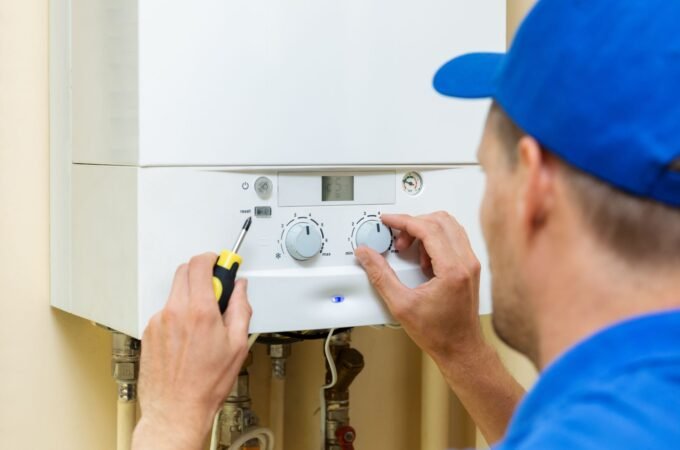
Understanding the Evolution and Efficiency of Modern Heat Pumps
Table of Contents
ToggleIntroduction to Heat Pump Technology
Reflecting on the present challenges of climate change and the ongoing quest for sustainable living, heat pump technology emerges as a pivotal innovation for eco-friendly home heating and cooling. These systems operate using electricity and are designed to be a dual-function solution, adept at providing warmth in the winter and cool air during the summer months. Among the varied options available, energy-efficient Mitsubishi heat pumps exemplify cutting-edge advancements, offering a compelling example of how comfort can be harmonized with a deep dedication to environmental stewardship.
In the global zeitgeist, there’s been a committed pivot towards systems that utilize renewable energy sources and significantly reduce carbon footprints. Detailed below, this exposition seeks to elucidate the advancements and emergent innovations in heat pump technology, painting a comprehensive picture for the environmentally-conscious homeowner eager for an efficient, cost-effective home heating solution.
The Principles of Heat Pump Operation
Heat pumps manifest a core scientific principle, dynamically transferring heat from one environment to another using a refrigeration cycle—similar to a home refrigerator. Even when the outside air appears cold, a heat pump can extract residual heat, amplify it, and transfer it indoors. The three predominant types, namely air-source, ground-source, and water-source heat pumps, each exploit a different medium (air, earth, or water) to draw warmth. Inherent to their efficacy is the concept itself and the precision with which systems are installed, meticulously sized, and adjusted to the individual characteristics and dimensions of the space they are to heat.
For instance, air-source heat pumps are frequently chosen for their relatively straightforward installation and operation, making them suitable for various residential contexts. Meanwhile, while potentially more efficient, ground-source (geothermal) and water-source models often require more significant initial investment and specific geographic conditions. Therefore, making a well-informed decision based on professional guidance is necessary when considering a heat pump installation.
Comparing Heat Pumps with Traditional Heating Systems
Traditional heating systems, such as furnaces or boilers that rely on the combustion of gas or oil, pale when contrasted with the operational efficiency of heat pumps. Notably, heat pumps provide a multiplicative output of heat for every unit of energy consumed, marked by a higher coefficient of performance (COP) than their conventional counterparts. Undoubtedly, this elevated efficiency presents pronounced cost advantages and energy conservation in the long run. Driving home, an even more compelling argument for their use is the heat pump’s ability to curtail the home’s carbon footprint. This advantage aligns well with the broader environmental insights steering modern energy policy.
The impact of these systems extends beyond individual households; on a macro-level, the widespread adoption of heat pumps signifies a noteworthy stride in the transition to a low-carbon future. As homeowners become ever more conscious of their budgets and the planet, heat pumps stand at the vanguard of a heating revolution, promising comfort and continuing their role as a responsible environmental choice.
Technological Advancements in Heat Pump Design
Spanning the past decade, the design and functionality of heat pumps have leaped forward thanks to vigorous research and development efforts. Today’s models come equipped with variable-speed compressors, multi-stage filtration systems, and enhanced heat-exchange materials that notably increase overall performance. This consistent drive toward higher Seasonal Energy Efficiency Ratios (SEER) and Heating Seasonal Performance Factor (HSPF) ratings speaks to growing industry standards and a consumer base that demands greater sustainability and energy efficiency in their heating and cooling systems.
Even the refrigerants employed in heat pumps have transformed. What was once a source of ecological concern due to their high global warming potential (GWP) has evolved into a new generation of compounds that offer a reduced environmental impact. Furthermore, as evidenced by the phenomenal rise in the recognition and adoption of heat pumps across diverse climates and continents, it is clear that this technology is evolving past niche applications, settling comfortably into mainstream usage.
Consumer Considerations for Heat Pump Installation
While heat pumps are one of the most versatile and efficient heating solutions on the market, selection and installation are laden with various considerations. The architecture of one’s home, the insulative properties of the building materials, and regional climatic conditions all impose certain demands on which heat pump model would be optimal. In this context, the expertise of a professional is invaluable, offering an intelligent understanding that transcends the mere technical specifications of a potential system to contemplate its harmony with the domicile in question.
Seasonal performance also emerges as a critical metric—a capable heat pump must maintain its composure and output even amidst the ebbs and flows of seasonal temperature variations. A poorly selected heat pump, underestimated in power or mismatched to the environmental rigors it will face, can lead to unduly high operating costs and suboptimal climate control—a fate readily averted with the sage counsel of a seasoned heat pump specialist.
Incentives and Rebates for Heat Pump Adoption
Various financial inducements and rebates by governmental institutions and private organizations further catalyze the transition to heat pump technology. These economic incentives are meticulously crafted to mitigate the initial capital outlay and galvanize the adoption of energy-efficient heating and cooling methodologies. Notably, these programs take on various forms, from direct discounts and rebates to long-term offerings such as tax credits and low-interest financing options. For residents who are eco-conscious and reasonable with their finances, these benefits manifest as a confluence of economic pragmatism and ecological responsibility—a win-win scenario in the campaign for sustainable living.
An illustrative testament to the effectiveness of such incentives is the surge in the heat pump market traceable, in no small part, to these subsidy programs. Navigational assistance through the labyrinthine realm of rebates is readily available, with numerous web-based resources and local energy advisory services standing by to lend expertise to homeowners embarking on this journey.
Heat Pumps in Cold Climates
Detractors of heat pump technology once pointed to its presumed ineptitude in the face of biting cold, arguing that its effectiveness waned as temperatures plunged. This assertion, however, has been roundly refuted by a new breed of heat pumps specifically designed to tackle the frosty challenges of colder climates. Crafted with robust compressors, these models maintain a steady performance even when mercury levels tumble below freezing—much to the relief and comfort of inhabitants in chillier locales.
That being said, achieving an optimal heating experience with a heat pump is not a mere function of system selection; attentive maintenance also becomes a salient factor. By ensuring that the system is regularly serviced and operating at its best, homeowners in colder regions can realize the full potential of heat pump technology, reaping its benefits throughout the year, even in the heart of winter.
Consumer Reviews and Experiences with Modern Heat Pumps
Gleaning through the myriad heartfelt testimonials and consumer reviews reveals a panorama of positive experiences with modern heat pumps. Users extol their seamless operation, energy efficiency, and the uniform climate control they furnish across the living space. Heat pumps have proven their mantle as a comprehensive solution efficiently addressing heating and cooling needs within the modern home, garnering acclaim for their capacity to deliver consistent, whisper-quiet operation.
Furthermore, the value proposition of heat pumps extends to the simplification of home energy systems. A single heat pump unit can adeptly replace separate heating and air conditioning systems, proffering a minimalist approach to energy consumption — a boon for homeowners seeking to streamline domestic operations. Accounted for in this chorus of approval are the authentic experiences of real people, echoing a narrative that dispels doubts and underscores the legitimacy of heat pumps as a foremost option for contemporary home climate control.
The Role of Professional Maintenance for Heat Pump Longevity
As sophisticated mechanical and electronic components amalgamations, heat pumps necessitate a disciplined maintenance regimen to preserve their functionality and extend their lifespan. Regular professional maintenance can have a profound impact, preventing abrupt system failures and extending a heat pump’s effective operational years. Skilled technicians perform a suite of tasks, including but not limited to inspecting and cleaning ducts, scrutinizing fluid levels, and testing for operational efficiency—efforts collectively ensuring the system’s resilience and reliability.
For homeowners, awareness of the telltale signs that their heat pump may require professional attention—things like sudden noises, unexplained increases in energy consumption, or fluctuations in thermal output—could predict immediate service. Addressing these indicators promptly can forestall the inconvenience and expense of emergency repairs, pointing to the inarguable importance of attentive, proactive care in the stewardship of one’s heat pump investment.
Wrapping Up: The Prospects of Heat Pumps as the Future of Home Heating
In the grand accounting of the evolution of home heating solutions, heat pumps emerge as a synthesis of innovation, efficiency, and sustainability. These systems speak of an era where green technology merges with the demands of personal comfort, marking them as a prominent symbol in the narrative of renewable energy adoption. Within the context of global environmental strategies aggressively pursuing carbon neutrality, heat pumps are posited not just as a viable alternative but as the prospective standard for residential and commercial heating and cooling.
Amplified by fiscal incentives and grounded in a bedrock of technological ingenuity, heat pumps are transitioning out of the periphery and into the mainstream consciousness. This shift heralds a reconfiguration of home heating paradigms, positioning heat pumps squarely at the forefront of the march towards an eco-conscious future, delineating them as the harbinger of profound change in energy consumption and conservation.





